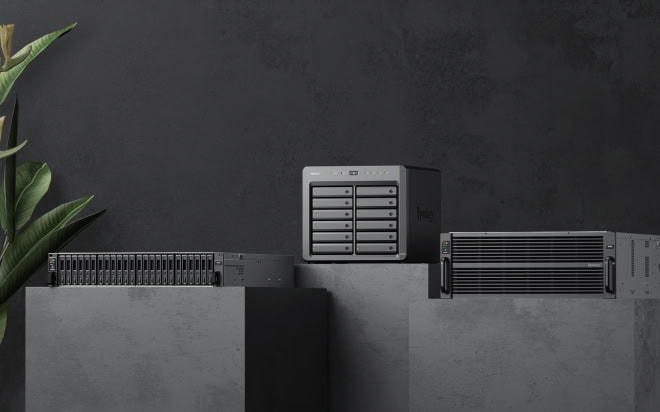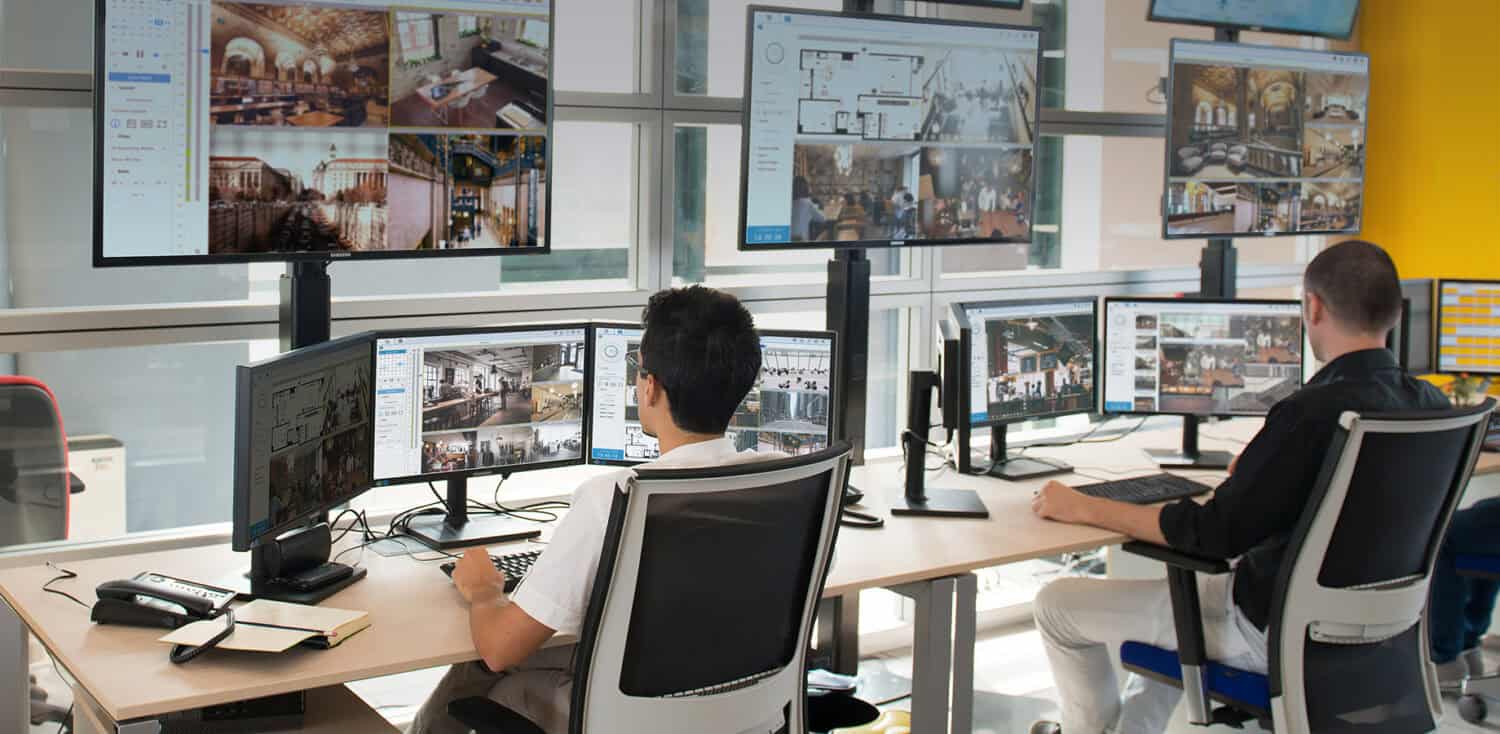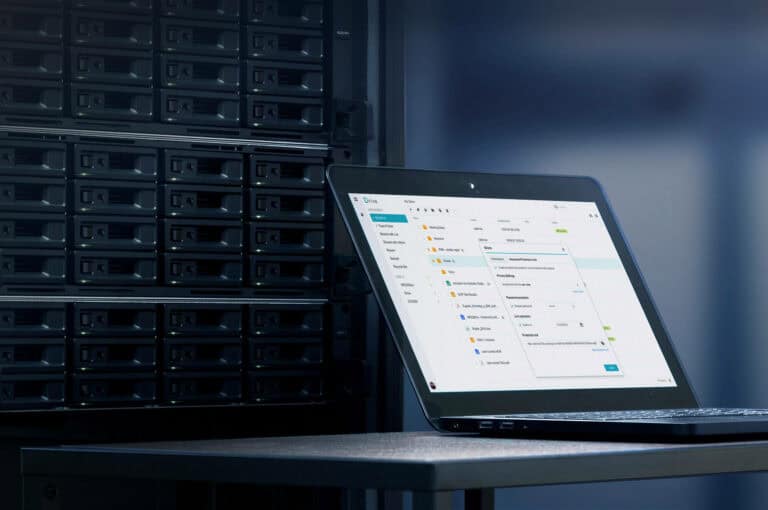Synology has been working for several years to optimize its offerings for enterprise environments, and we are seeing increasing results. For the primary functionality of data storage, several NAS servers are suitable. In addition, support for productivity and surveillance scenarios is being increasingly developed. This article explains how to deploy Synology solutions to make them functional within a large organization.
When Synology systems are deployed in large enterprise environments, they are often used to store documents, backups, and video footage. Depending on the needs, a very large NAS may be chosen. Think of a server that can support up to 300 disks, giving a lot of storage capacity. Such a system can also handle very large files to meet the organization’s diverse requirements.
Tip: Synology HD6500: storage server for enterprises
Increase productivity
Once it is clear which servers will be the basis for supporting the business strategy in the next years, it is useful to look at how the solutions can help make employees more efficient. Ideally, the investment pays off in business value. Synology has designed the systems to contribute to a productivity boost in multiple ways.
One option is to embrace the Synology Office Suite, an alternative to Microsoft 365 and Google Workspace. This suite includes Drive, Office, Mail, Calendar, Contacts, Chat and Notes applications. Basically, all the tools you use from the familiar productivity suites to create, store and enable file collaboration. While new users will probably get used to working with these apps, Synology sees the benefits of the solutions. For example, with the NAS systems as its foundation, it can promise that data remains private, with strong encryption standards. The Office Suite is a standard part of the NAS.
For businesses that find it an interesting option, Synology offers support through migration services to move from Microsoft 365, Google Workspace, Dropbox or Box to Office Suite.

In many organizations, however, it will be desirable to continue using Microsoft 365 or Google Workspace simply because these suites are dominant. One of the two is often preferred by the employee, which is valuable for productivity. In that case, the role of Synology NAS servers does not stop with productivity applications; they can also serve as a backup location for files generated with Microsoft 365 and Google Workspace. For this, Synology has customized solutions. This makes it possible to use a productivity suite that is well-secured in any situation.
Also read our story, in which we discuss protecting data on a Synology NAS and from productivity suites.
Keep devices working and optimise deployments
A properly set-up NAS system can bring productivity gains to your organization. Yet Synology has looked beyond just supporting productivity apps and wants to increase efficiency around technical issues. For example, Synology has developed artificial intelligence that can help improve technical support, known internally as support AI.
For enterprises, this is an interesting innovation. Implementations within their companies are often very complex and require support. Customers may knock on the door with questions about product usage, critical troubleshooting and implementation advice. However, a support request can also be simple but still end up with customer service. Support AI can now handle such basic questions and provide immediate resolution. If a technical support engineer is still needed due to complexity, they can be available faster because the AI handles the more straightforward questions, leaving more time for more complex issues.
Synology claims significantly higher support response times, sometimes even improving by a factor of 20.
Support AI works based on a RAG architecture, which means it cites relevant documents and refines the model’s final output. Synology’s AI accesses anonymized technical materials and troubleshooting insights gained from millions of customers’ experiences with technical issues. This customer data is anonymized. A reinforcement learning process is also applied to improve the AI’s performance continuously.

Basis for AI
The possibilities Synology is exploring around AI also directly touch on another feature of the NAS server. Large organizations, in particular, see AI as a way to transform work. It can not only make employees more productive but also create new revenue opportunities. With the acceleration in AI development, more and more will likely be deployed on this technology within large organizations.
AI ultimately requires data, which is fed to a model to generate an output. The more data and the more accurate it is, the better an AI system’s response/outcome. Ideally, then, an enterprise has a lot of data. And again, storage capacity is needed for that, which Synology can provide.
Surveillance within a large environment
A very different use case than we have discussed so far, but which can be interesting nonetheless, is having Synology serve as the basic infrastructure for camera surveillance. Some large organizations need to be able to monitor everything remotely and react on time. To help with that, Synology has been working in recent years to make Surveillance Station more interesting in enterprise environments. Features and innovations have come out of that. Synology is seeing the benefits of these efforts by signing up large customers. As a result, it can show that Surveillance is an interesting option for large organizations as well.
For example, the company shares a customer story with us from Q-Park. This company was faced with the challenge of replacing outdated security solutions, which regularly malfunctioned with firmware updates and no longer met current security standards. The existing system, running on Windows 7, no longer had support, leading to vulnerabilities. In addition, it lacked disk and power redundancy, increasing the risk of data loss and power outages. Looking for a future-proof and easy-to-manage security solution, Q-Park decided to switch to Synology.
Surveillance Station met Q-Park’s requirements and solved the old system’s problems. The company installed a central RackStation server at its headquarters in Leeds, supplemented by additional servers and about 2,000 cameras at various locations. The new infrastructure offered benefits, including dual power supplies for uninterrupted operation and a RAID configuration that enabled disk redundancy. This ensured that data was stored securely and could be recovered quickly in the event of disk failures. The addition of HAT3000 Plus Series HDDs increased reliability and significantly reduced downtime during hardware problems, Synology indicates.

As a large organization, Q-Park saw particular value in the Centralized Management System (CMS). This allowed central management of all servers, making the security infrastructure more efficient and reducing the risk of incidents. Employees could view live video feeds and receive notifications via mobile apps, which is crucial for quick response and flexibility. The integration of Synology BC500 cameras offered advanced AI features, such as person and vehicle detection, with no additional licensing costs. Linking to existing Microsoft AD accounts allowed employees to log in easily. A high availability cluster ensured uninterrupted monitoring even during server outages.
Value for enterprises
In our opinion, Synology demonstrates the versatility of its offering for large organizations. It offers solutions for various needs, from data storage and productivity enhancement to monitoring systems. For organizations looking to strengthen their IT infrastructure, investing in solutions that meet current demands and are future-proof is essential. In any case, Synology continues to innovate and adapt to the needs of enterprises, precisely those where a lot of storage is required.
